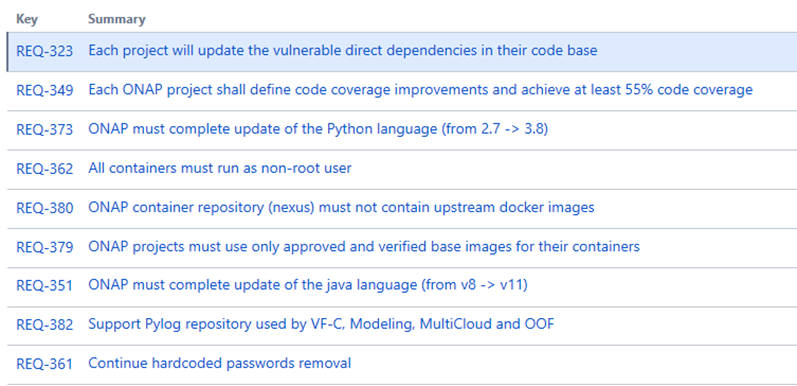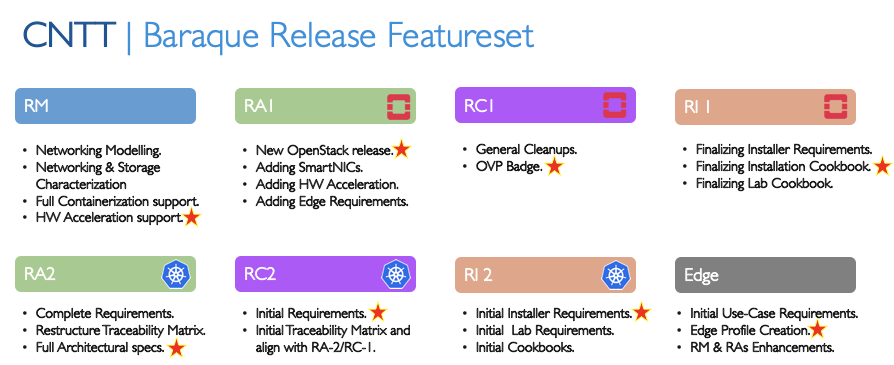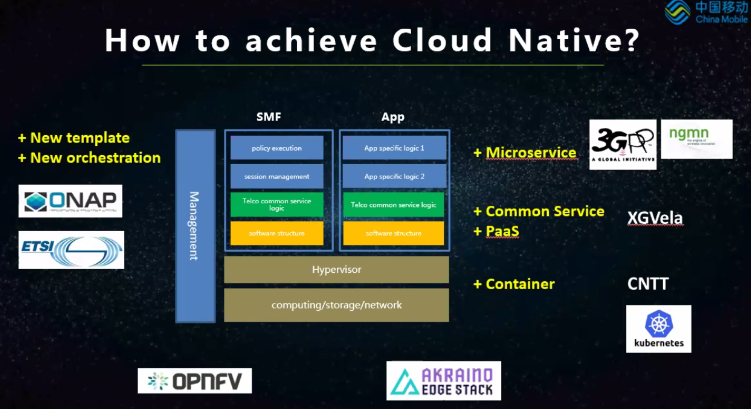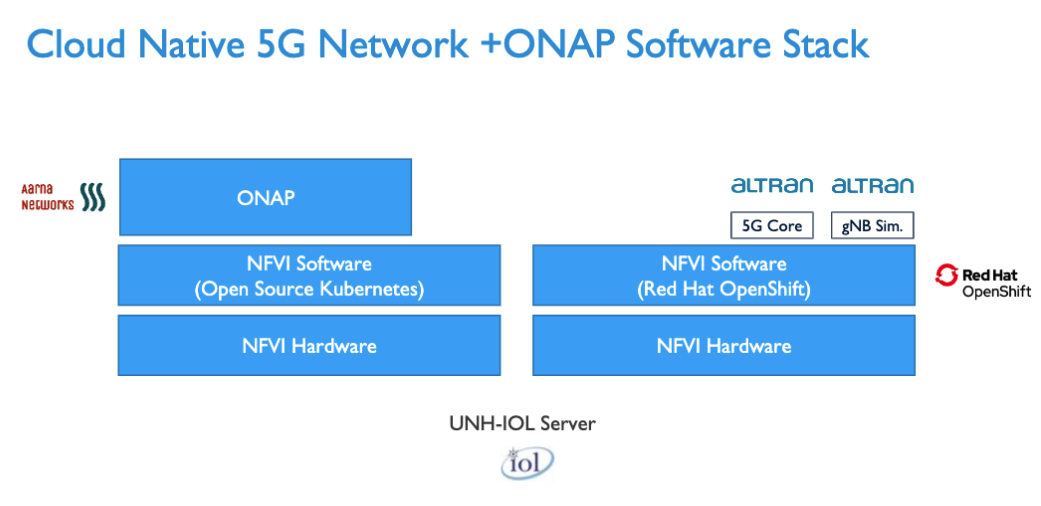June 22nd, 2020 - Day 1
ONAP Track | Key Points | Challenges | Next Steps/Action Items |
|---|---|---|---|
Track: Requirements Subcommittee meeting and presentation of Guilin planned work Presenter/Moderator: Alla Goldner |
|
|
|
Track: License compliance & how to deal with it? Presenter/Moderator: Krzysztof Opasiak / Catherine Lefevre | Details regarding Non functional requirements REQ-379, REQ-380 - https://wiki.onap.org/display/DW/License+compliance The list of "Base Image statistics" can be enhanced as long as the ONAP Community will maintain it. |
| |
Track: Integration Status update: what's planned internally Presenter/Moderator: Morgan Richomme |
|
| |
Track: Modeling Subcommittee Meeting https://wiki.onap.org/display/DW/Modeling+2020-06-22+Special+Virtual+Face+to+Face+Meeting | Reviewed current modeling activities and candidate modeling requirements for Guilin. The following topics were also presented: 1 Modeling process 2 Policy model 3 Slicing model 4 CNF Inventory Modeling 5 CNF ETSI modeling overview 6 Modeling of Geolocation information Recording may be found at: LNF_June_vDTF-ONAP-_Modeling_Subcommittee.mp4 | invite to join those discussions | |
Track: Policy Framework Guilin Prioritization Presenter/Moderator: Pamela Dragosh |
| https://wiki.onap.org/display/DW/2020+Frankfurt+Tutorials | |
| Cross Community Track | Key Points | Challenges | Next Steps/Action Items |
Track: Help Recruit more Developers to LFN Projects! Presenters/Moderators: Jason Hunt , Abhijit Kumbhare , Al Morton , Catherine Lefevre , Morgan Richomme , Ranny Haiby |
|
| |
| CNTT/OPNFV Track | Key Points | Challenges | Next Steps/Action Items |
| OPNFV Kick-off, and Round-Robin Project Reviews | So far, so good! | Need to use this Wiki Page for Day two and beyond, for notes etc. | |
CNTT Kickoff with Baraque Release |
| Please attend all CNTT sessions and participate in the discussion. |
June 23rd, 2020 - Day 2
Cross Community Track | Key Points | Challenges | Next Steps/Action Items |
|---|---|---|---|
Track: Shift to Release Train Presenters/Moderators: Catherine Lefevre | ›The Challenges from LFN Projects ›Release Cadence in Other Open Source projects >Shift to Release Train & Brainstorming Wiki notes: Shift to Release Train 2020-06-23 | ›How can we release more frequently, smaller scope without impacting the SW quality? ›How can we change the waterfall-ish development model? ›How can we get enough details about candidates requirements prior the release? ›How to manage the release in case of people turn-over? ›How to handle the scope and maintain a balance between Usecase/Functional reqs (attractive) and Non functional reqs (less sexy)? |
|
Track: XGVela Presenters/Moderators: Qihui Zhao |
| ||
Track: Cloud Native in Telecom Cloud Presenters/Moderators: Qihui Zhao, Ying Li |
|
| |
| ONAP Track | Key Points | Challenges | Next Steps/Action Items |
OOM Status update: what's planned internally Presenters/Moderators: Sylvain Desbureaux, Krzysztof Opasiak | Review of the planned OOM changes : Support of Helm V3 Kubernetes V1.17 (or 1.18) Migrate to Seccom recommended Versions Update defaults (use Ingress, Storage Class, Hardened OS) | Might be breaking gating during changes, impact deployments | check if Helm V3 requires Kubernetes v1.17+ |
OOM Status update: consequences on other components Presenters/Moderators: Sylvain Desbureaux, Krzysztof Opasiak | Review of the required changes on components helm charts VS requirements presentation of changes, use of templates, adding appender to Logback to support STDOUT as additional output Container that do not contain ONAP code should not be hosted on Nexus No Root access to DB Application config should be fully prepared before starting the container Containers must crash properly when a failure occurs No more Nodeports AAF optional (component should work without AAF even in degraded mode) HTTPS is mandatory but should be configurable (disable in case of Service Mesh as this will be offloaded to Service Mesh) Container RootFS should be mounted as ReadOnly Commit message rules for OOM | AAF removal or optional / POC SMesh | SecCom to follow up and define what disabling AAF means |
Requirements Traceability: Initial Request through TSC Approval Presenters/Moderators: Alla Goldner, Chaker Al-Hakim, Pawel Pawlak, Pamela Dragosh, David McBride, Catherine Lefevre |
wiki: 2020 June vDTF ONAP Requirements Traceability: Initial Request through TSC Approval |
|
|
Presenters/Moderators: Konrad Bańka Samuli Silvius Lukasz Rajewski | The presentation covers Frankfurt CNF instantiation improvements on vFW use case example
Use Case Doc: https://onap-doc.readthedocs.io/projects/onap-integration/en/latest/docs_vFW_CNF_CDS.html#docs-vfw-cnf-cds |
|
|
Orchestration of 5G CNFs using Multicloud K8s plugin Presenter: Sandeep Sharma |
|
| |
Python ONAP SDK Presenter: Michal Jagiello | Version 1.0 of the SDK was released and will be available using pip. Presentation provided an overview of the project capabilities:
SDK requires Python 3.7 or higher and was tested with ONAP Frankfurt. |
| |
Frankfurt Post Mortem Presenter : David McBride | Review Frankfurt Schedule changes & pain points
| Release more frequently VS time |
|
| CNTT Track | Key Points | Challenges | Next Steps/Action Items |
| Performance (Joint with OPNFV) |
|
| |
| Traceability Test Cases (Joint with OPNFV) |
| ||
| Use cases of SDN solution |
| ||
| Field Trial Status (Joint with OPNFV) |
| ||
| Next CNTT OpenStack Release & Cyborg Acceleration Mgmt |
| As a result of the discussion, the next step will be to present an option of moving straight to Ussuri. Action on Pankaj Goyal | |
| OPNFV Track | Key Points | Challenges | Next Steps/Action Items |
| <Many CNTT meetings were Joint with OPNFV Today!> | See above - Scheduling was a non-challenge again today! | ||
| OPNFV TSC Meeting |
| Need to clarify OPNFV interactions with CVC/OVP: this entity was not formed yet at the time OPNFV was Chartered. |










